

There’s nothing quite like the excitement of planning a getaway. Forget the hesitation of taking time off work or the costs associated with traveling, because committing to at least one vacation a year is good for your health.
Once you start counting down the days until your departure, you’ll also want to think about what you’ll wear, which books you’ll bring, the sights you’ll see, and the food you’ll taste.
Despite an emphasis on having a good time, you should always keep safety at the front of your mind. While you’ll probably consider the security of your destination before booking a vacation, you might not be prepared for risky situations until it’s too late.
Travel scams, assault, and theft are just a few ways your safety could be compromised while on vacation – and your travel research might not prepare you enough. For a closer look at the precautions that people take before traveling and their biggest concerns while away, keep reading.
Proper Planning

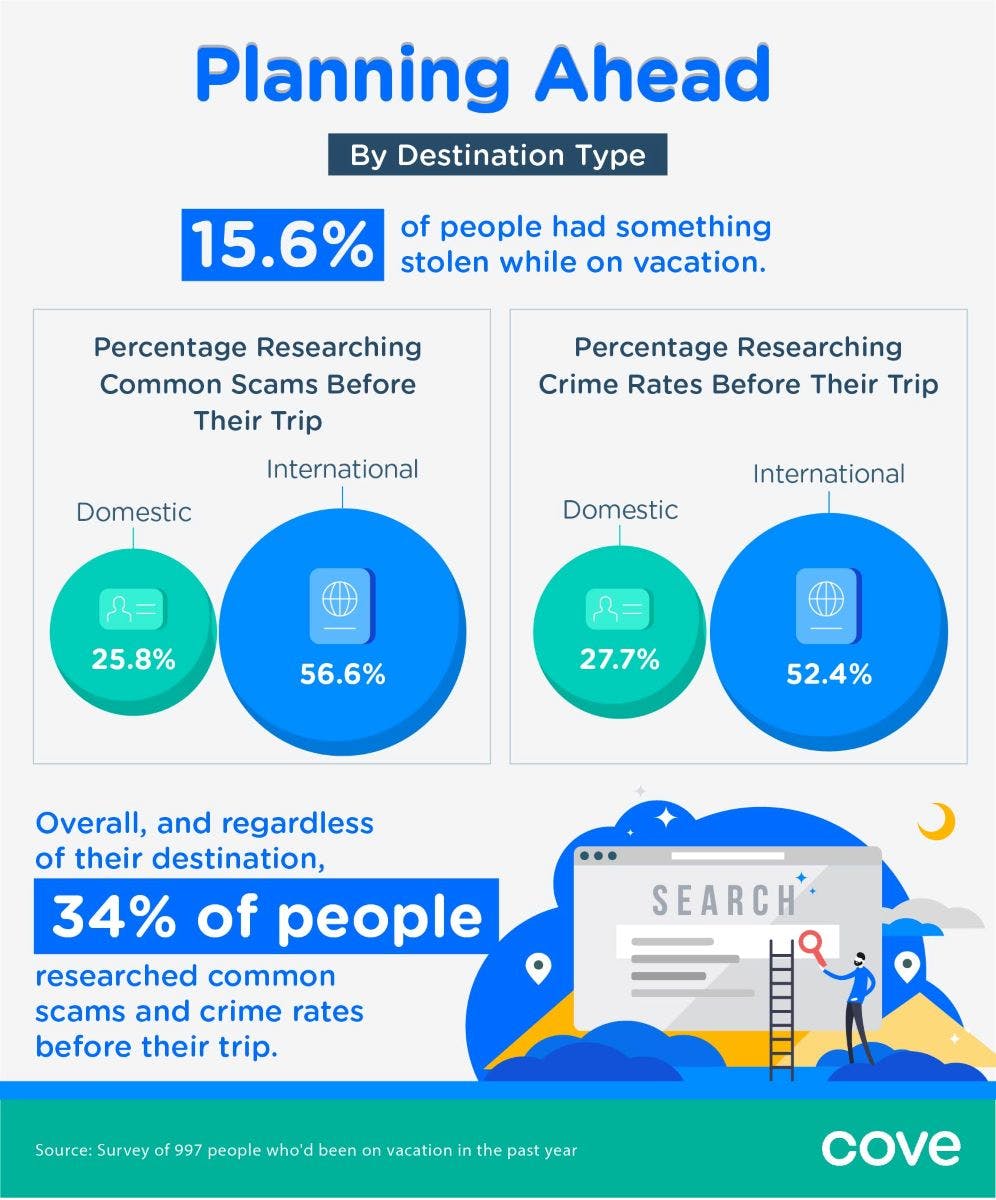
When thinking about where to take your family for a nice, relaxing break, you should at least consider the overall crime rate of your destination. The U.S. Department of State even goes so far as to identify a list of countries travelers should avoid or exercise increased caution in while traveling.

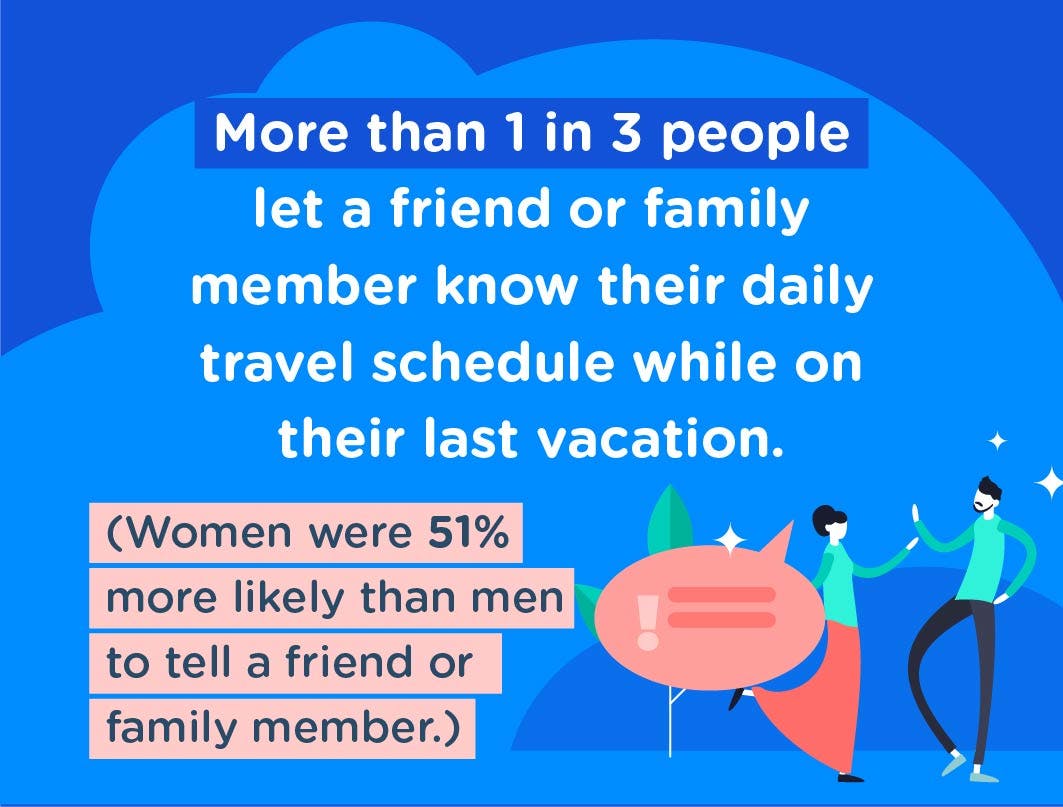
In fact, tourists are considered prime targets for criminal activity. The “bump and grab” (where someone bumps into you and takes an item like your wallet or phone) may sound familiar, but what about ATM scams, fake city officials, bus scams, or prepaid taxi scams?
Overall, roughly 1 in 3 people researched common scams or crime rates at their destination before traveling. However, people were more inclined to research common scams (57%) and crime rates (52%) when traveling abroad compared to domestic trips.
Protecting Your Possessions

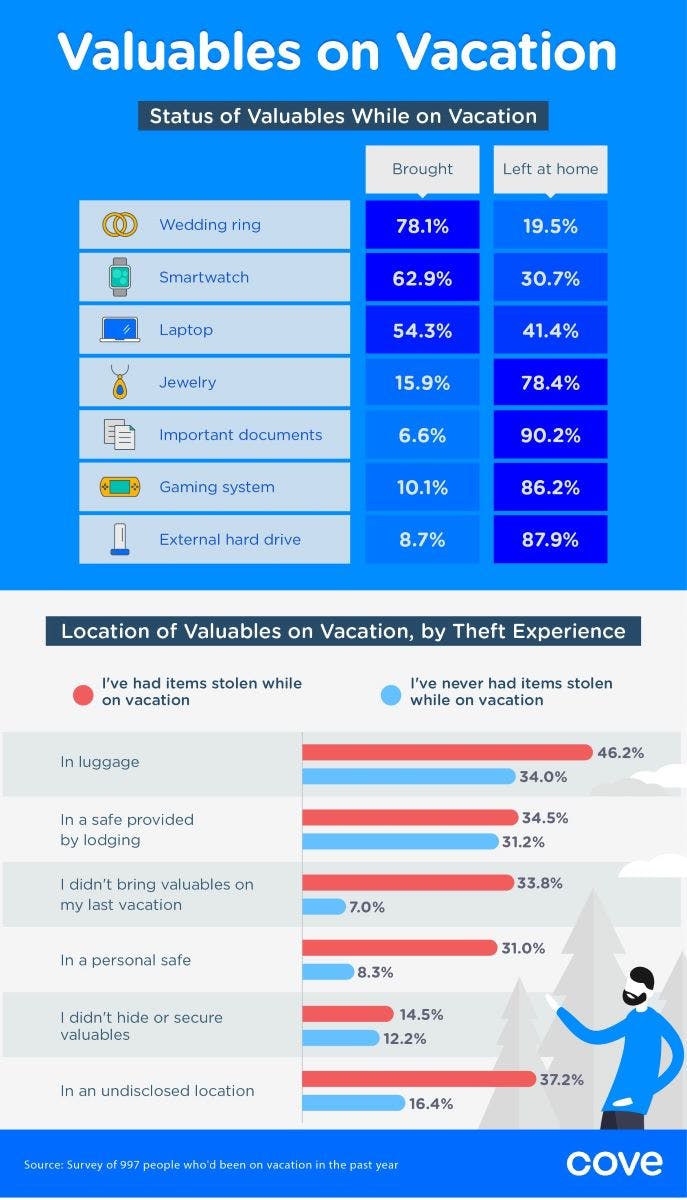
In 2016, Kim Kardashian West was robbed at gunpoint in her Paris hotel room while traveling from the U.S. The estimated cost of the jewelry stolen totaled over $10 million.
Most of us don’t have a bodyguard to keep us (or our possessions) safe when traveling, but there are still ways to avoid being targeted while on vacation. Experts recommend dressing casually whenever possible, keeping a close eye on overly friendly strangers, and being mindful of the valuables you pack with you.
While most people traveled with their wedding ring, laptop, and smartwatch, they opted to leave the rest of their jewelry, important documents, and gaming systems behind. However, for people who did bring their valuables on vacation, the most common hiding spots included their luggage (46% for people who have had items stolen before, and 34% who haven’t had items stolen stored their items there) and a safe provided by their lodging (35% and 31% respectively), although more than 1 in 10 people confessed to not hiding their valuables at all, regardless of having items stolen on vacation before.
Cash or Credit?

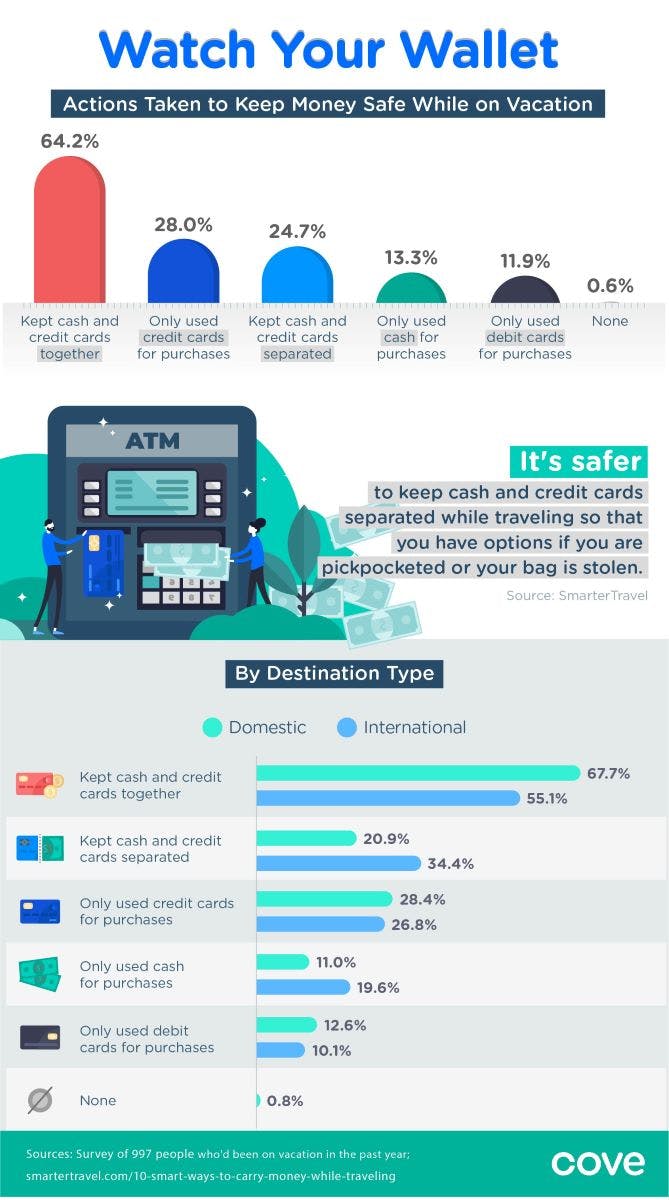
When you’re on an international trip, not all payment methods are created equal. You’ll need to take conversion rates and international fees into consideration when making purchases, but that doesn’t necessarily mean cash is the only way to go.
Domestically or internationally, having some cash on hand while you’re away isn’t a bad idea, but experts warn against traveling with pockets full of paper money. Not only do you usually have to pay a fee to convert currency but if your wallet is lost or stolen, there may be no way to recover those funds. Instead, it’s typically recommended that you combine your travel money, including credit cards without conversion fees or prepaid travel cards. Ultimately, it’s important to ensure your payment methods aren’t kept in the same place in case of an emergency.
Sixty-four percent of people polled admitted to keeping their cash and credit cards together while traveling, including nearly 68% of domestic travelers and 55% of international travelers. Another 28% only used credit cards, and 1 in 4 kept their cash and credit cards separate. In most cases, travelers were more cautious while abroad compared to their domestic excursions.
Home Sweet Home

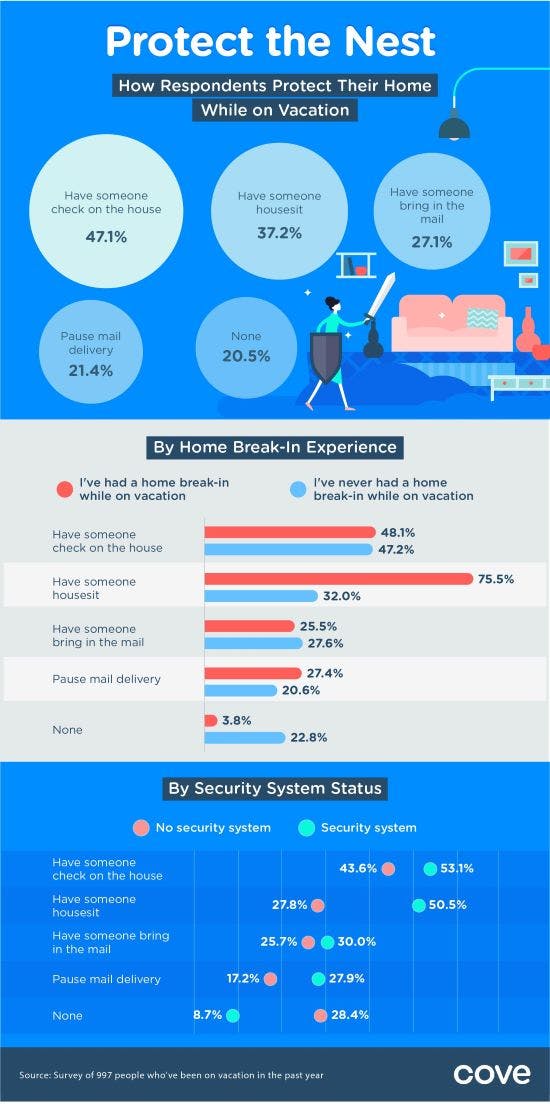
Keeping your family and possessions safe while you’re traveling doesn’t mean only thinking about your destination. Burglars may look for signs that you or your family is away on holiday before they strike. A home invasion can happen in a matter of minutes, and most burglars walk right through the front door.
According to our survey, people may think about their safety while away but forget to protect their property back home. Less than half of those polled had someone check on their house while on vacation, and 37% had someone housesit.
People with active security systems were more likely to take extra steps to protect their homes, including having someone check in (53%) or housesit (almost 51%). More than 28% of people without a home security system made no effort to protect their homes while traveling.
High-Tech Security

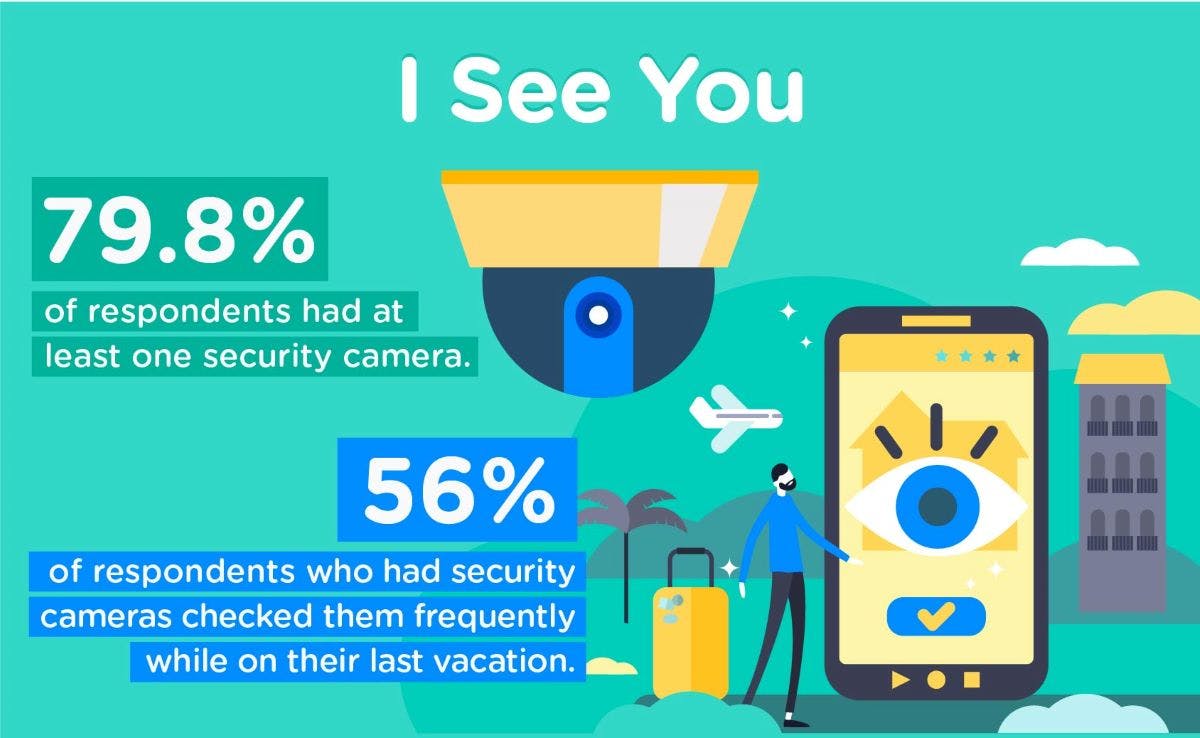
It’s been established – even by criminals – that a security system or “beware of dog” sign is a powerful deterrent for burglars. At the same time, high-tech security measures can also prevent home break-ins. Motion lights, smart locks, and video doorbells are all popular security tools to protect your home. Nearly 4 of 5 people surveyed said they have at least one security camera, and over half of them check their camera feeds frequently while on vacation.

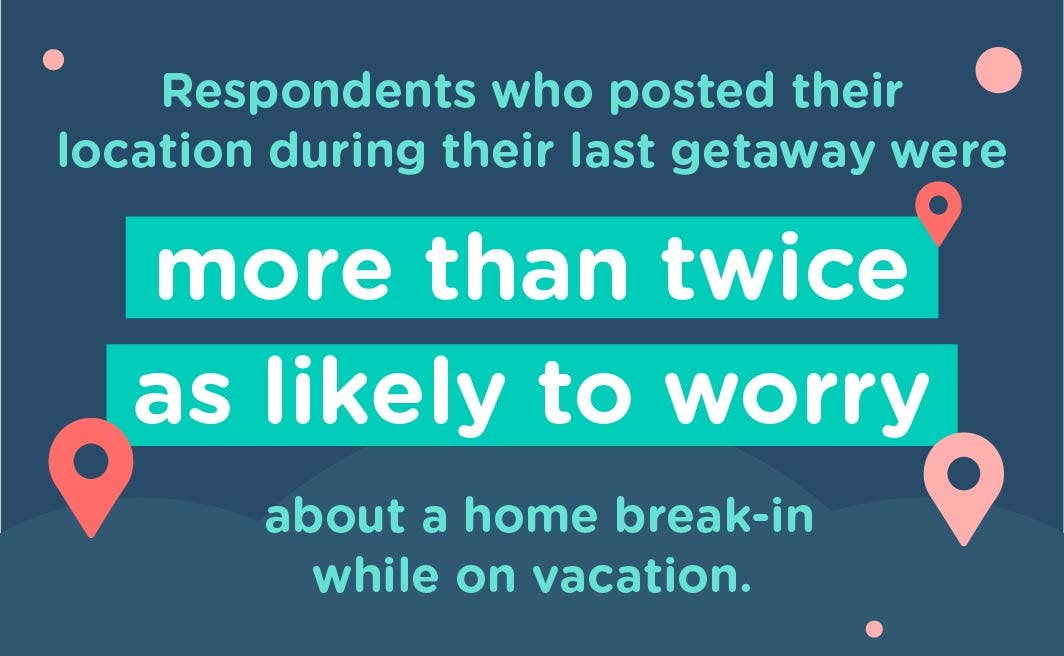
Social Exposure

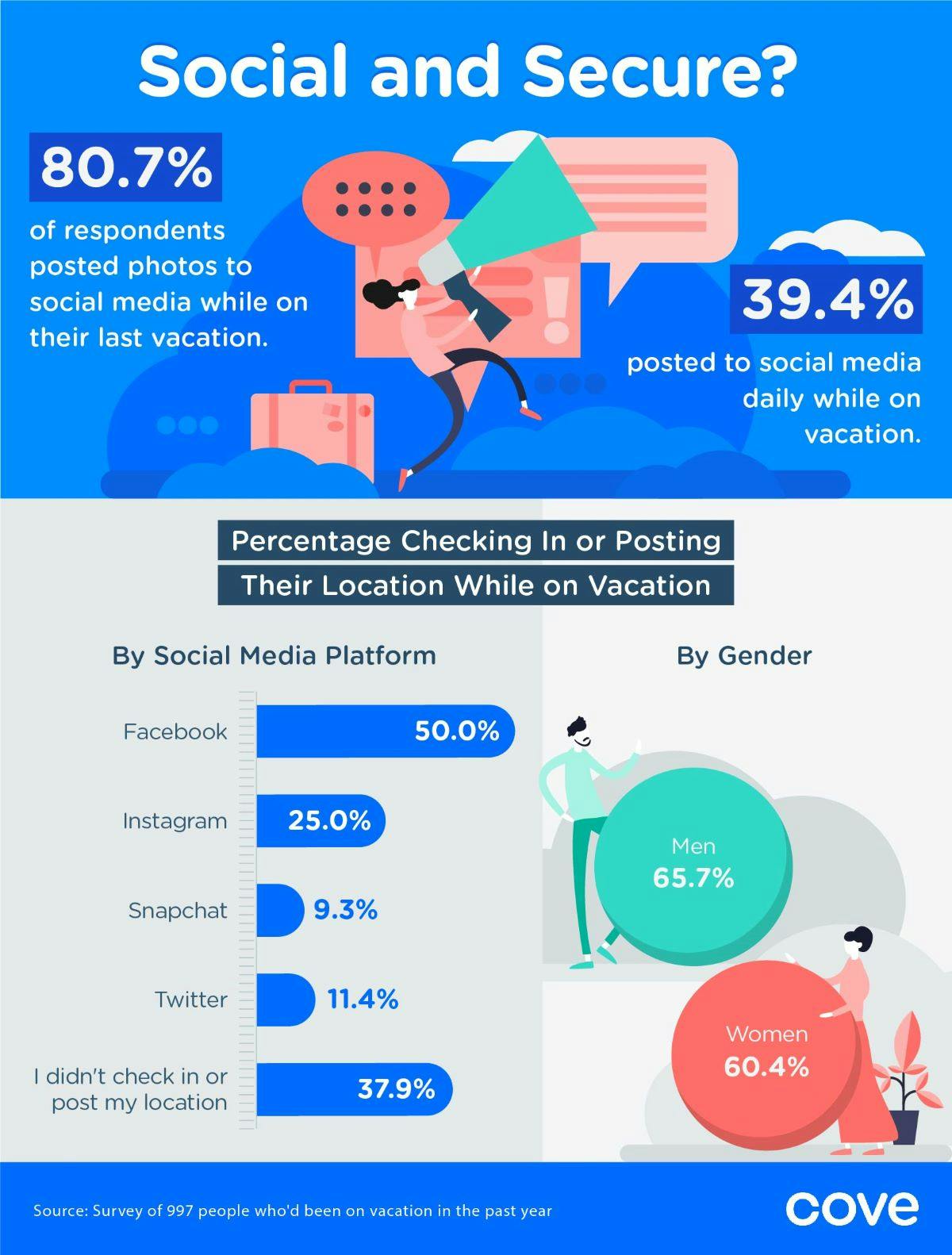
So you’re getting ready to go on vacation. You’ve packed your bags, checked safety travel advisories, and ensured you have access to your home security cameras. You’re ready to go, and you can’t wait to share the pictures from your trip on your social media feed.


Despite the effort that you’ve put into preparing for your trip and making sure everything is safe and protected, a simple post on Facebook or Instagram could undo all of that hard work. Travel experts recommend not sharing pictures from your vacation until after you’ve returned home because it’s hard to know who might be seeing the pictures you post, and you never know who knows that your house is unattended; especially if you have friends on Facebook who you don’t actually know, or are still Facebook friends with someone you’re not friendly with anymore.
While 38% of people avoided checking in or posting their location while away, 50% did so on Facebook, and 25% did the same on Instagram. This type of behavior was more common among men (66%) than women (over 60%) and could put your home at risk.
Safe and Secure
When you’re planning a vacation, there is a lot to do – figuring out what to wear, where to eat, and how to keep everyone entertained – without thinking about the security of what you’re leaving behind. Homes left alone on vacation can be major targets for break-ins, and you might send the wrong signals to a potential thief. More than 28% of people without a security system said they did nothing to protect their home while away, and another 39% of people posted to their social media feeds daily while on vacation.
At COVE, we’ll make sure you have real-time protection at home no matter where you are in the world. Our DIY home security systems are low cost, contract-free, and professional-grade to give you the best of both worlds. You’ll also get 24/7 professional support and text messaging to keep you updated on what matters most when you need it. Get the ultimate peace of mind on your next vacation with a COVE home security system. Visit us today to learn more.
Methodology and Limitations
To gather the data presented in the above study, a survey was conducted using the Mechanical Turk Service from Amazon. There were a total of 997 respondents. Of these, 518 were women, 478 were men, and one person chose to identify as neither. 104 of the respondents were baby boomers, 249 were from Generation X, 608 were millennials, and 36 belonged to generations outside those.
To qualify for this survey, respondents had to have been on at least one vacation in the past year and have an account with at least one social media platform. All data presented in the study rely on self-reporting, which can be host to issues such as telescoping and exaggeration. To combat these issues, an attention check was added to the survey to ensure respondents were not answering randomly.
Sources
https://www.fodors.com/news/news/one-american-vacation-behavior-that-simply-has-to-stop https://www.nbcnews.com/better/wellness/5-scientifically-proven-health-benefits-traveling-abroad-n759631 https://www.cnn.com/travel/article/international-travelers-concerned-safety/index.html https://travel.state.gov/content/travel/en/traveladvisories/traveladvisories.html/ https://theplanetd.com/common-travel-scams/ https://www.huffpost.com/entry/kim-kardashian-paris-robbery-interview_n_5bcddb73e4b055bc9483098c?guccounter=1&guce_referrer=aHR0cHM6Ly93d3cuZ29vZ2xlLmNvbS8&guce_referrer_sig=AQAAAA-7WB6plBAGQQoUhyyK_PMpJFbVZxAetS2xcmaUxRPWNU27z13LWLJB8Lon_svVywls5GUjlwlD8nW9swTz_K60Cq3OcplZRqvunRgCJf4W8bNI6-jMq_mtWVQH3Dx2Y-ECBvGCUJE5RTfT5KHNV7Y-t9m2Uo_qZe3JetJzTrE1 https://www.travelawaits.com/2394621/6-tips-to-avoid-getting-robbed-on-vacation/ https://www.tripsavvy.com/should-i-take-cash-debit-or-credit-card-2972945 https://www.safewise.com/blog/8-surprising-home-burglary-statistics/ https://www.ktvb.com/article/news/crime/we-asked-86-burglars-how-they-broke-into-homes/277-344333696 https://www.safety.com/8-burglar-deterrents-to-consider-and-5-to-avoid/ https://www.wheretraveler.com/advice/dont-post-travel-photos-until-you-read
Fair Use Statement
Your readers are probably thinking about their summer travel plans, but they might be missing important safety tips. We encourage you to share the results of our study (and any related graphics or images) for noncommercial use with the inclusion of a link back to this page.
